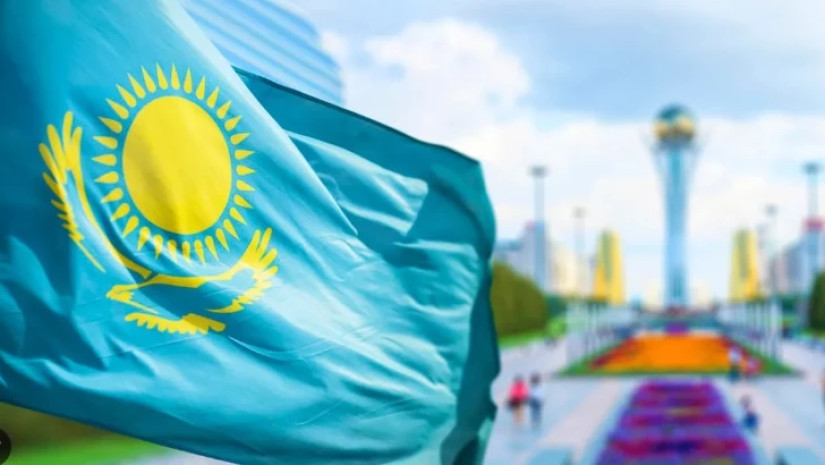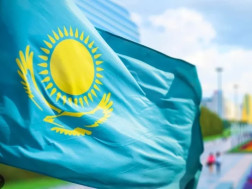The global financial market speaks a language and investors can learn to read the mind of the market. Financial markets tend to discount the future. Rare earth elements are becoming the new oil in the age of artificial intelligence & energy transition.
Rex Tillerson, the former CEO of ExxonMobil and former Secretary of State of the United States, stated:
"Kazakhstan represents an extraordinary opportunity for investment, with its wealth of natural resources and strategic location at the crossroads of Europe and Asia. The country's commitment to creating a favorable investment climate makes it an attractive destination for businesses looking to capitalize on its potential."
Legendary investor and father of emerging markets investing, Dr Mark Mobius stated.
"Kazakhstan's vast endowment of natural resources presents compelling opportunities for savvy investors. With its stable economic policies and commitment to fostering foreign investment, Kazakhstan offers a promising environment for those looking to capitalize on its resource wealth."
Kazakhstan is an important country with regards to REE rare earth elements or critical materials and its domestic stock market so far in USD terms returns is the 6th best performing stock market globally.
As Saudia Arabia was the kingdom of oil, Kazakhstan could become the Saudi Arabia of critical materials.
Geopolitics and ESG and climate change will become more important and will drive Earth elements (REEs) or critical materials global demand.
The United States is heavily reliant on China for imported critical minerals, with 50% of domestic consumption depending on imports for 43 of 50 critical minerals. China's dominance in rare earth metals poses a national security threat to western democracies, and the US faces a multi-decade decline in investment in its domestic mining and exploration industry.
The US government is incentivizing domestic mining and separation sectors to boost domestic supply chains and reduce reliance on China.
Reducing dependence on petrol-burning vehicles and adopting low-carbon technologies to power tomorrow’s and Generative AI economy are trends accelerating across the globe. Certain countries and companies will benefit and will be able to create attractive or even outsized returns for investors.
Kazakhstan has been a reliable supplier of oil, gas and uranium. Amidst the ongoing global green transition, the country of Kazakhstan is committed to evolve into an equally reliable supplier of critical minerals.
The mining and metallurgical complex (MMC) is the second most important sector for Kazakhstan's economy, second only to the oil and gas industry.
In the structure of Kazakhstan's economy, the mining and metallurgical complex occupies one of the main places along with the oil and gas industry.
The MMC sector in Kazakhstan is represented by the active work of about 40 transnational companies, including such major players as Glencore, RioTinto, Trafigura, Polymetal and others.
Today Kazakhstan, with its considerable competence in the production of rare metals, which is already part of the global value chain, exporting titanium, beryllium, tantalum, niobium and others.
leveraging Kazakhstan’s substantial raw material base, the country is ready to collaborate following the principle of «raw materials in exchange for technology and integration into the global value chain. KZ produces semi-finished products of rare earth such as ammonium perrenate and ammonium metavanadate. For these types of raw materials, the companies are working on modernisation of production and deepening of processing.
Investors have the possibility of developing man-made mineral formations, often called secondary deposits.
Today Kazakhstan offers the global market a number of critical raw metals such as beryllium, tantalum, niobium and fluorspar. All of these are produced in eastern Kazakhstan.
By the end of 2023 Kazakhstan adopted a Comprehensive Plan for the Development of Rare and Rare Earth Metals which highlights the main tasks to achieve this goal:
First - The development of the mineral resource base.
Here, our focus lies in the geological exploration of deposits and the analysis of the industrial tailings, where rich contents of vital elements are found.
We are also considering granting the priority right of subsoil use to investors engaged in geological exploration at their own expense. Thus, investments in exploration secure the priority right of the subsoil use.
Second - The expansion of existing, and development of new production facilities.
Kazakhstan possesses a unique competence in the production of beryllium, tantalum, and osmium, placing our country among the selected countries with such specialized capabilities. We have clear plans to expand such activities to build a strong technological platform. Kazakhstan has also pursued investment projects for the production of hafnium, lithium, cobalt, and nickel. The country aims to achieve this through long-term partnership with technological leaders in this domain, including those from EU countries.
Kazakhstan also places particular emphasis on establishing a cluster for the production of battery raw materials, utilising nickel, cobalt, manganese, and lithium. In this context, a collaborative Kazakh-German project is dedicated to the extraction and processing of lithium (together with HMS Bergbau, geological exploration is underway on the territory of the deposits).
During 2024, Kazakhstan has plans to unveil an auction for 23 deposits, 9 of which are specifically designated for critical raw materials.
Furthermore, the country is planning to conduct an auction for 84 available deposits (44 of which are designated for critical raw materials) in coming years. These deposits will be transferred to investors through electronic auctions.
It is estimated that there are 124 deposits of rare metal and rare earth minerals in Kazakhstan.
Minerals such as: pyrite, magnetite, muscovite, molybdenite, wolframite, cassiterite, albite, apatite, spodumene, ilmenite, zircon, rutile, monazite, xenotime, bastnaesite, gadolinite and many others.
They contain lithium, titanium, zirconium, vanadium, tantalum, niobium, molybdenum, tungsten, nickel, cobalt, tin and others.
Kazakhstan is leveraging its substantial raw material base and the country is ready to collaborate following the principle of “raw materials in exchange for technology and integration into the global value chain”.
Kazakhstan legal and institutional reforms are strategically designed to create a favourable investment climate and foster connections with international partners.
Kazakhstan has created favourable conditions for geological exploration and mining. Tax rates for the extraction of rare and rare earth metals are set in the range from 1% to 7.8% (the lowest in subsurface use).
Furthermore, the issuance of licenses for subsurface use has been automated through a unified platform, minerals.gov.kz, thus promoting transparency in these processes.
To facilitate the implementation of significant investment projects, investors can sign an Investment Agreement and an Investment contract with the Government, outlining provisions for exceptional benefits.
The country holds a leading position in global metal production, being among the top ten producers of such important metals as copper, aluminium, gold, silver, titanium and zinc. This ensures Kazakhstan's status as a key player in the international market.
Kazakhstan's titanium (producer UKTMK JSC) is recognised by leading companies in the aerospace and automotive industries and has an 11% share of the global market share and 21% in the aerospace industry and counts Boeing and Airbus as customers. Kazakhstan also offers tolling services for processing rhenium – an essential component for aircraft engine materials.
Kazakhstan plays an important role and will continue to strengthen its role as a СRM processor and producer of finished metallurgical products, or the so-called key representative of the "midstream" (the middle link of the global production chain - "midstream").
It is of paramount importance to note that investing in REEs can be speculative and risky. The underlying market for these elements can be volatile, influenced by factors such as changes in technology, geopolitical tensions, and regulatory policies. Additionally, the success of REE investments depends on factors like the development of new technologies, mining and extraction advancements, and global economic trends. As with any investment, thorough research and consideration of the associated risks are essential.
Rainer Michael Preiss, Partner & Portfolio Strategist at Das Family Office in Singapore
















